task1.1
1 #include <stdio.h> 2 #include <string.h> 3 4 void func(int argc, char *argv[]); 5 6 int main(int argc, char *argv[]) 7 { 8 int i; 9 func(argc, argv); 10 for(i = 1; i < argc; ++i) 11 printf("hello, %s\n", argv[i]); 12 13 return 0; 14 } 15 16 void func(int argc, char *argv[]) 17 { 18 int i,j; 19 char *temp; 20 for(j = 1; j < argc; j++) 21 { 22 for(i = 1; i < argc - j; i++) 23 { 24 if(strcmp(argv[i], argv[i+1]) > 0) 25 { 26 temp = argv[i]; 27 argv[i] = argv[i+1]; 28 argv[i+1] = temp; 29 } 30 } 31 } 32 }
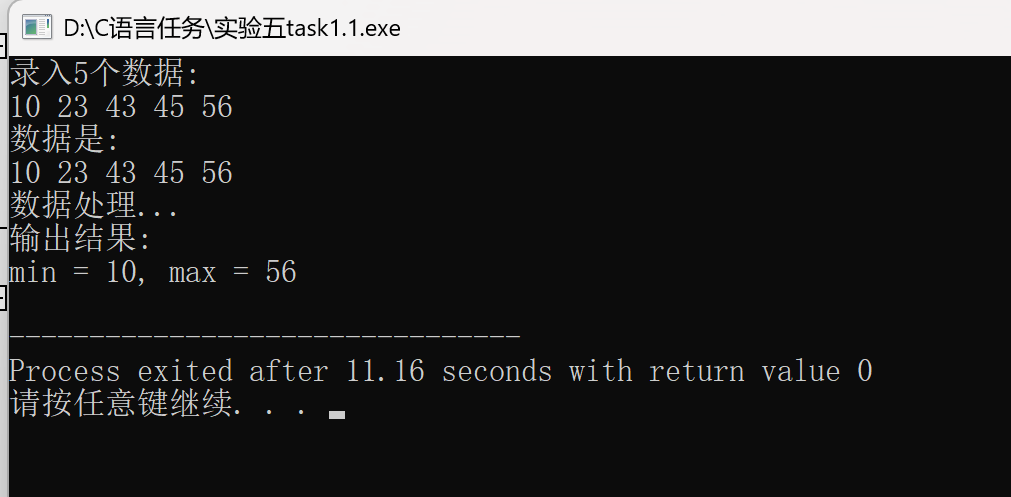
1.找出数据中的最大值和最小值
2.指向数组名的地址
task1.2
1 #include <stdio.h> 2 #define N 5 3 4 void input(int x[], int n); 5 void output(int x[], int n); 6 int *find_max(int x[], int n); 7 8 int main() { 9 int a[N]; 10 int *pmax; 11 12 printf("录入%d个数据:\n", N); 13 input(a, N); 14 15 printf("数据是: \n"); 16 output(a, N); 17 18 printf("数据处理...\n"); 19 pmax = find_max(a, N); 20 21 printf("输出结果:\n"); 22 printf("max = %d\n", *pmax); 23 24 return 0; 25 } 26 27 void input(int x[], int n) { 28 int i; 29 30 for(i = 0; i < n; ++i) 31 scanf("%d", &x[i]); 32 } 33 34 void output(int x[], int n) { 35 int i; 36 37 for(i = 0; i < n; ++i) 38 printf("%d ", x[i]); 39 printf("\n"); 40 } 41 42 int *find_max(int x[], int n) { 43 int max_index = 0; 44 int i; 45 46 for(i = 0; i < n; ++i) 47 if(x[i] > x[max_index]) 48 max_index = i; 49 50 return &x[max_index]; 51 }

1.一组数据中的最大值
2.不可以,会被回收
task2.1
1 #include <stdio.h> 2 #include <string.h> 3 #define N 80 4 5 int main() { 6 char s1[N] = "Learning makes me happy"; 7 char s2[N] = "Learning makes me sleepy"; 8 char tmp[N]; 9 10 printf("sizeof(s1) vs. strlen(s1): \n"); 11 printf("sizeof(s1) = %d\n", sizeof(s1)); 12 printf("strlen(s1) = %d\n", strlen(s1)); 13 14 printf("\nbefore swap: \n"); 15 printf("s1: %s\n", s1); 16 printf("s2: %s\n", s2); 17 18 printf("\nswapping...\n"); 19 strcpy(tmp, s1); 20 strcpy(s1, s2); 21 strcpy(s2, tmp); 22 23 printf("\nafter swap: \n"); 24 printf("s1: %s\n", s1); 25 printf("s2: %s\n", s2); 26 27 return 0; 28 }
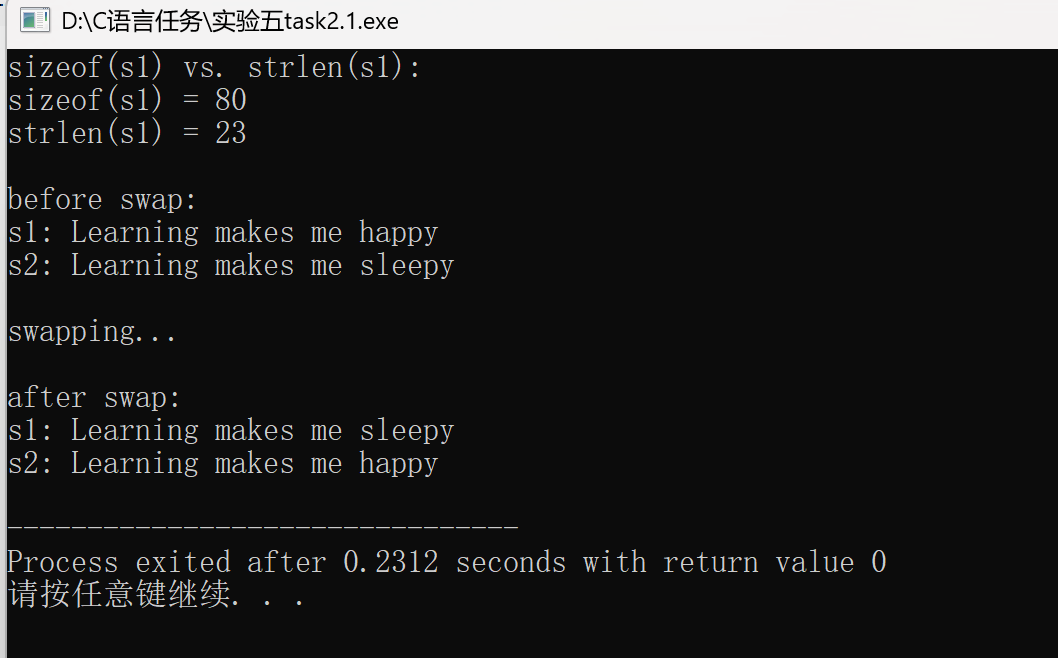
1.80,S1的长度,S1的字符数
2.可以
3.会交换
task2.2
1 #include <stdio.h> 2 #include <string.h> 3 #define N 80 4 5 int main() { 6 char *s1 = "Learning makes me happy"; 7 char *s2 = "Learning makes me sleepy"; 8 char *tmp; 9 10 printf("sizeof(s1) vs. strlen(s1): \n"); 11 printf("sizeof(s1) = %d\n", sizeof(s1)); 12 printf("strlen(s1) = %d\n", strlen(s1)); 13 14 printf("\nbefore swap: \n"); 15 printf("s1: %s\n", s1); 16 printf("s2: %s\n", s2); 17 18 printf("\nswapping...\n"); 19 tmp = s1; 20 s1 = s2; 21 s2 = tmp; 22 23 printf("\nafter swap: \n"); 24 printf("s1: %s\n", s1); 25 printf("s2: %s\n", s2); 26 27 return 0; 28 }
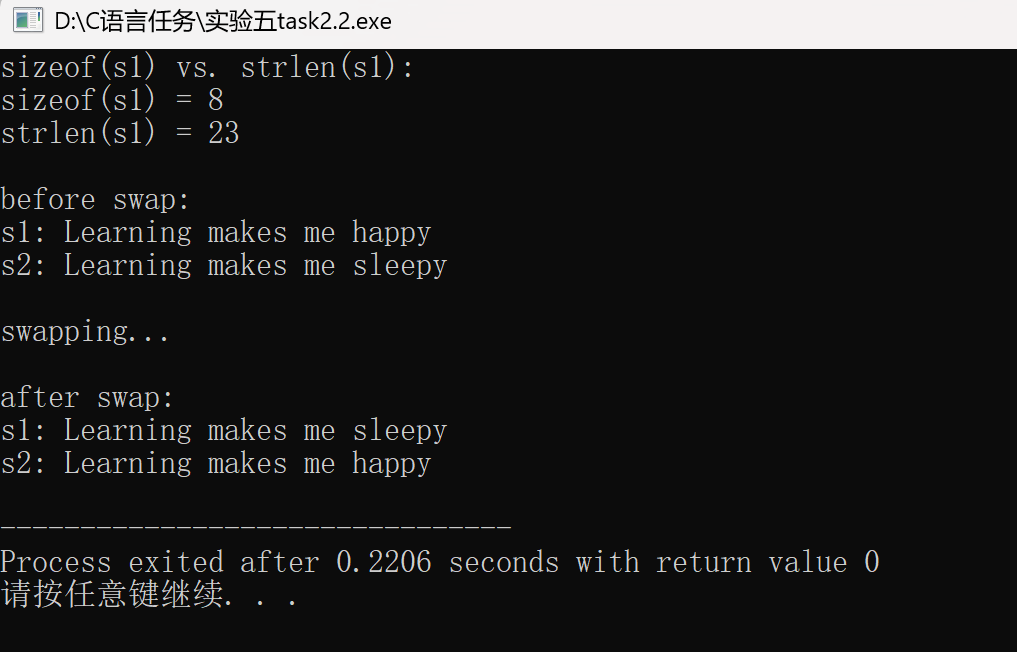
1.首字母地址,s1占内存大小,s1指向字符长度
2.不可以
3.不交换
task3
1 #include <stdio.h> 2 3 int main() { 4 int x[2][4] = {{1, 9, 8, 4}, {2, 0, 4, 9}}; 5 int i, j; 6 int *ptr1; // 指针变量,存放int类型数据的地址 7 int(*ptr2)[4]; // 指针变量,指向包含4个int元素的一维数组 8 9 printf("输出1: 使用数组名、下标直接访问二维数组元素\n"); 10 for (i = 0; i < 2; ++i) { 11 for (j = 0; j < 4; ++j) 12 printf("%d ", x[i][j]); 13 printf("\n"); 14 } 15 16 printf("\n输出2: 使用指针变量ptr1(指向元素)间接访问\n"); 17 for (ptr1 = &x[0][0], i = 0; ptr1 < &x[0][0] + 8; ++ptr1, ++i) { 18 printf("%d ", *ptr1); 19 20 if ((i + 1) % 4 == 0) 21 printf("\n"); 22 } 23 24 printf("\n输出3: 使用指针变量ptr2(指向一维数组)间接访问\n"); 25 for (ptr2 = x; ptr2 < x + 2; ++ptr2) { 26 for (j = 0; j < 4; ++j) 27 printf("%d ", *(*ptr2 + j)); 28 printf("\n"); 29 } 30 31 return 0; 32 }

task4
1 #include <stdio.h> 2 #define N 80 3 4 void replace(char *str, char old_char, char new_char); // 函数声明 5 6 int main() { 7 char text[N] = "Programming is difficult or not, it is a question."; 8 9 printf("原始文本: \n"); 10 printf("%s\n", text); 11 12 replace(text, 'i', '*'); // 函数调用 注意字符形参写法,单引号不能少 13 14 printf("处理后文本: \n"); 15 printf("%s\n", text); 16 17 return 0; 18 } 19 20 // 函数定义 21 void replace(char *str, char old_char, char new_char) { 22 int i; 23 24 while(*str) { 25 if(*str == old_char) 26 *str = new_char; 27 str++; 28 } 29 }
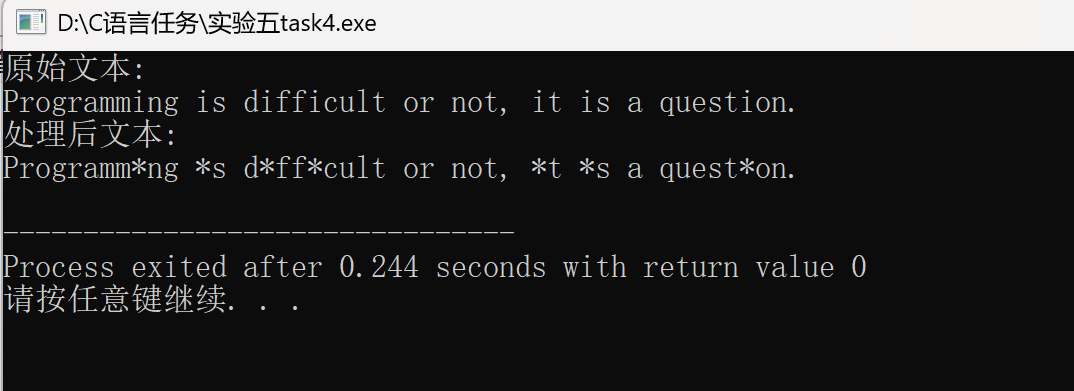
1.把i替换成*
2.可以
task5
1 #include <stdio.h> 2 #define N 80 3 4 char *str_trunc(char *str, char x); 5 6 int main() { 7 char str[N]; 8 char ch; 9 10 while(printf("输入字符串: "), gets(str) != NULL) { 11 printf("输入一个字符: "); 12 ch = getchar(); 13 getchar(); // 吸收换行符 14 15 printf("截断处理...\n"); 16 str_trunc(str, ch); // 函数调用 17 18 printf("截断处理后的字符串: %s\n\n", str); 19 } 20 21 return 0; 22 } 23 24 // 函数str_trunc定义 25 // 功能: 对字符串作截断处理, 把指定字符第一次出现及其后的字符全部删除, 并返回字符串地址 26 char *str_trunc(char *str, char x) { 27 char *p = str; 28 while (*p != '\0') { 29 if (*p == x) { 30 *p = '\0'; 31 break; 32 } 33 p++; 34 } 35 return str; 36 }
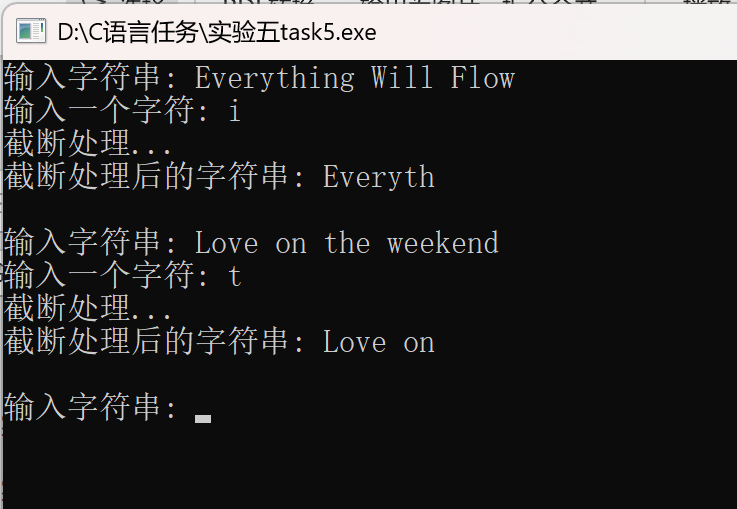
不同,吸收回车符
task6
1 #include <stdio.h> 2 #include <string.h> 3 #define N 5 4 5 int check_id(char *str); 6 7 int main() { 8 char *pid[N] = {"31010120000721656x", 9 "3301061996x0203301", 10 "53010220051126571", 11 "510104199211197977", 12 "53010220051126133Y"}; 13 int i; 14 for (i = 0; i < N; ++i) { 15 if (check_id(pid[i])) 16 printf("%s\tTrue\n", pid[i]); 17 else 18 printf("%s\tFalse\n", pid[i]); 19 } 20 return 0; 21 } 22 23 int check_id(char *str) { 24 int len = strlen(str); 25 // 身份证号码必须是18位 26 if (len != 18) { 27 return 0; 28 } 29 int i; 30 for (i = 0; i < 17; i++) { 31 // 前17位只能是数字 32 if (!(str[i] >= '0' && str[i] <= '9')) { 33 return 0; 34 } 35 } 36 // 检查最后一位,只能是数字或者大写X 37 if (!(str[17] >= '0' && str[17] <= '9' || str[17] == 'X')) { 38 return 0; 39 } 40 return 1; 41 }
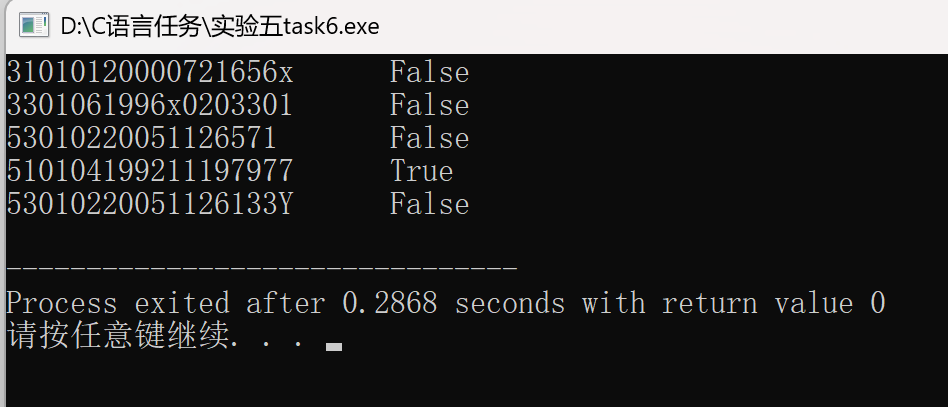
task7
1 #include <stdio.h> 2 #include <string.h> 3 #include <ctype.h> 4 5 // 函数声明 6 void encoder(char *str, int n); 7 void decoder(char *str, int n); 8 9 int main() { 10 char words[1000]; 11 int n; 12 13 printf("输入英文文本: "); 14 fgets(words, sizeof(words), stdin); 15 // 去除fgets读取的换行符 16 words[strcspn(words, "\n")] = '\0'; 17 18 printf("输入n: "); 19 scanf("%d", &n); 20 getchar(); // 吸收换行符 21 22 printf("编码后的英文文本: "); 23 encoder(words, n); 24 printf("%s\n", words); 25 26 printf("对编码后的英文文本解码: "); 27 decoder(words, n); 28 printf("%s\n", words); 29 30 return 0; 31 } 32 33 // 对编码的字符串进行编码处理 34 // 编码规则: 每个英文字母用其后面第n个英文字母替换,字母之外的其它字符保持不变 35 void encoder(char *str, int n) { 36 int len = strlen(str); 37 for (int i = 0; i < len; i++) { 38 if (isalpha(str[i])) { // 判断是否为字母 39 if (islower(str[i])) { // 小写字母情况 40 str[i] = (str[i] - 'a' + n) % 26 + 'a'; 41 } else { // 大写字母情况 42 str[i] = (str[i] - 'A' + n) % 26 + 'A'; 43 } 44 } 45 } 46 } 47 48 // 对编码的字符串进行解码处理 49 // 解码规则: 每个英文字母用其前面第n个英文字母替换,字母之外的其它字符保持不变 50 void decoder(char *str, int n) { 51 int len = strlen(str); 52 for (int i = 0; i < len; i++) { 53 if (isalpha(str[i])) { // 判断是否为字母 54 if (islower(str[i])) { // 小写字母情况 55 str[i] = (str[i] - 'a' - n + 26) % 26 + 'a'; 56 } else { // 大写字母情况 57 str[i] = (str[i] - 'A' - n + 26) % 26 + 'A'; 58 } 59 } 60 } 61 }
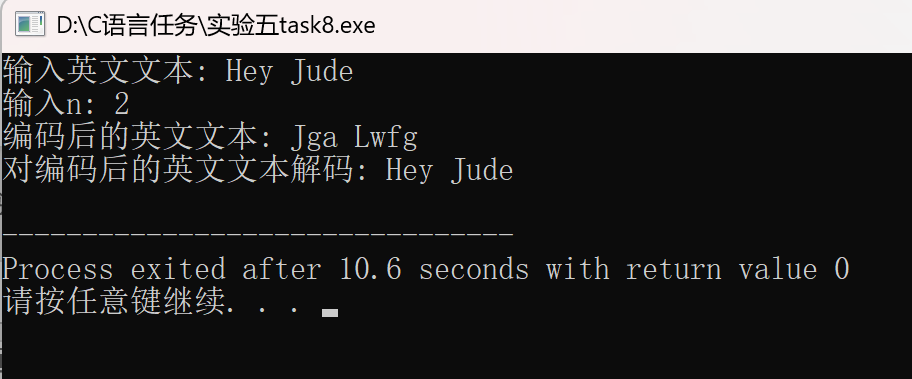
task8
1 #include <stdio.h> 2 #include <string.h> 3 #include <stdlib.h> 4 5 // 比较函数,用于qsort排序,按照字典序比较两个字符串 6 int compare(const void *a, const void *b) { 7 return strcmp(*(char **)a, *(char **)b); 8 } 9 10 int main(int argc, char *argv[]) { 11 int i; 12 if (argc < 2) { 13 printf("请输入姓名作为命令行参数\n"); 14 return 1; 15 } 16 // 对命令行参数(从argv[1]开始)进行排序 17 qsort(argv + 1, argc - 1, sizeof(char *), compare); 18 for (i = 1; i < argc; i++) { 19 printf("hello, %s\n", argv[i]); 20 } 21 return 0; 22 }




 浙公网安备 33010602011771号
浙公网安备 33010602011771号